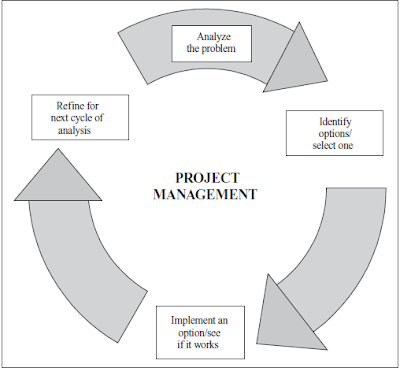The phases of a project are basically the same as an individual’s method of problem solving, but when the project’s outcome is bigger or more chal-lenging, the system breaks down. People in separate functional departments see the problem differently. Agreed-on approaches get interpreted differ-ently by specialists with diverse values and training. Actions influence other actions, sometimes undercutting each other or slowing implementation. Somehow, small problems can evolve into a myriad of complexities, dependencies, and challenges. Priorities become difficult to sort out.
Projects require a process just like in problem solving (see Figure 1-3). The first phase, usually called initiation, is when the idea is worked out and described, its scope and success criteria defined, its sponsors identified, its resources estimated, and its authority formalized. Then the project manager and team decide how it can be achieved practically, plan it out, and allocate the resources and risks by task and phase. Finally, the project manager and team put the plan into action during project execution. Project management professionals counter the complexity just described by formalizing the process. They then orchestrate it with teams, managing task interfaces, reducing risk, and solving the remaining implementation problems within resource and time constraints. Once they have the experience behind them, they assess whether it turned out the way it was expected to, why or why not, and define what can be done better next time. The group applies the learn-ing to sequential projects and makes best-practice examples available to
FIGURE 1-3 Comparing project management with problem solving. Both proj-ect management and problem solving require a process to be effective.
other projects in the organization. The phases of a project closely resemble
the stages of problem solving: initiation/concept development (analyze the
problem), high-level/detailed planning (identify options/select one), execution/
control (implement an option/see if it works), and closure and lessons
learned (refine for next cycle of analysis).

No comments:
Post a Comment